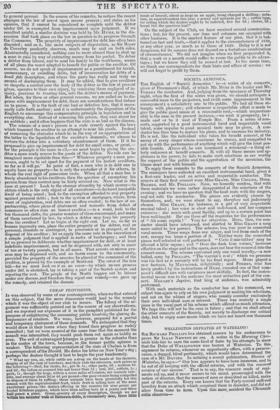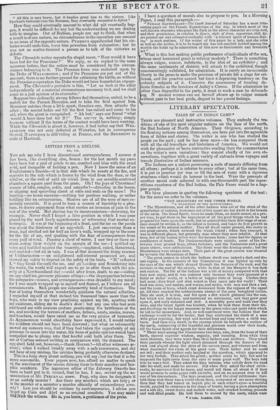WELLINGTON DEFEATED AT WATERLOO!
SIR RICHARD PHILLIPS has obtained renown by his endeavours to prove Sir ISAAC NEWTON an ass. A writer in the Morning Chronicle bids fair to earn the same kind of fame by his attempts to show that the Duke of WELLINGTON was beaten at Waterloo. To this., argument he returns, whenever an opportunity offers, with a perseverance, a dogged, blind pertinacity, which would have determined the case of a Mr. DAVIES. In noticing a recent publication, Stories of Waterloo, he says—" Our loss appears to have been immense, and to be out of all keeping with the official returns, and with the received version of our success." That is to say, the wiseacre reads of regiments cut up, and it never occurs to his mind, preoccuRied with the notion of disaster, that the masses of men so described as killed, make part of the returns. Every one knows that the Forty-second suffered terrribly from an attack which surprised them in disorder, and did not allow them time to form. Upon this mere, accident the Chronicle critic observes—. " All this is very brave, but it implies great loss to the victors. Like pyrrhus's victories over the Romans, they eventually amounted to defeat." How they could eventually amount to what did n6t eventually hap. pen, it would be difficult for any but the understanding we are dealing with to imagine. Out of Bedlam, people are apt to think, that when a result is of one nature, no circumstances in the operation can amount to an issue of the opposite nature. PYRRHUS apprehended that his victories would undo him, leave him powerless from exhaustion; but he was not so scatter-brained a person as to talk of the victories as defeats. The Chronicle writer repeats the stupid sneer, "How would it have been but for the Prussians ?" We reply, as we replied to the same nonsense before, that the action must be considered by the circumstances belonging to it. The Prussian force was reckoned upon by the Duke of WELLINGTON; and if the Prussians are put out of the account, there is no further ground for criticising the battle, as without the Prussian cooperation the Duke would not have hazarded an engagement The Chronicle's postulate is this, "Let us look at the affair independently of a material circumstance necessary to it, and we shall come to a just opinion of its character." Suppose two ordinarily strong fellows feel themselves, united, to be a match for the French Hercules, and to taker the field against him. Monsieur catches them a little apart, thrashes one, then attacks the other ; the second holds out till the first has rallied and conie to his aid, when the giant is vanquished. " Ah but," says our friend "what would A have done but for B ?" The answer is, nothing; simply because without B the terms of the contest would have been wanting. While the Chronicle is about it, however, it had better say that WELLINGTON was not only defeated at Waterloo, but in consequence thereof, NAPOLEON is still 'ruling in France, and the BOURBONS in exile at Hartwell.



















 Previous page
Previous page